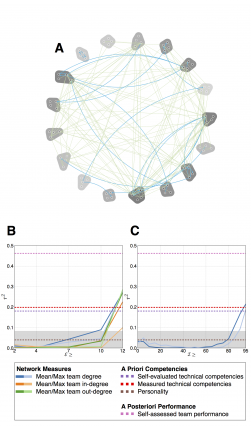New study reveals the strength of the strongest ties in collaborative problem solving

In a study published recently in Nature's Scientific Reports, MIT Media Lab researchers showed that networking does not improve team performance. Their findings showed that only the participants' strongest ties had an actual effect on their performance—and the stronger the ties a team had, the better the team performed. None of the participants' weak instrumental (goal-oriented) or expressive (personal) networking ties significantly impacted the performance of their teams.
The research further showed that a team's strongest ties were the best predictor of its performance. A team's strongest ties indicated a performance better than the technical abilities of its members, what the members already knew on the topic, or their personality types.
When solving problems in a competitive environment, the study revealed, it does not matter how many people someone knows or networks with—what really matters are the strongest ties in the network. This has implications for the organization of teams of scientists, engineers, and a host of others tackling today's most complex problems.
The paper, "The Strength of the Strongest Ties in Collaborative Problem Solving," was published in the June 20 issue of Scientific Reports.
More information: "The Strength of the Strongest Ties in Collaborative Problem Solving." Yves-Alexandre de Montjoye, et al. Scientific Reports 4, Article number: 5277. DOI: 10.1038/srep05277. Received 28 March 2014 Accepted 14 May 2014 Published 20 June 2014
Journal information: Scientific Reports
Provided by Massachusetts Institute of Technology
This story is republished courtesy of MIT News (web.mit.edu/newsoffice/), a popular site that covers news about MIT research, innovation and teaching.















